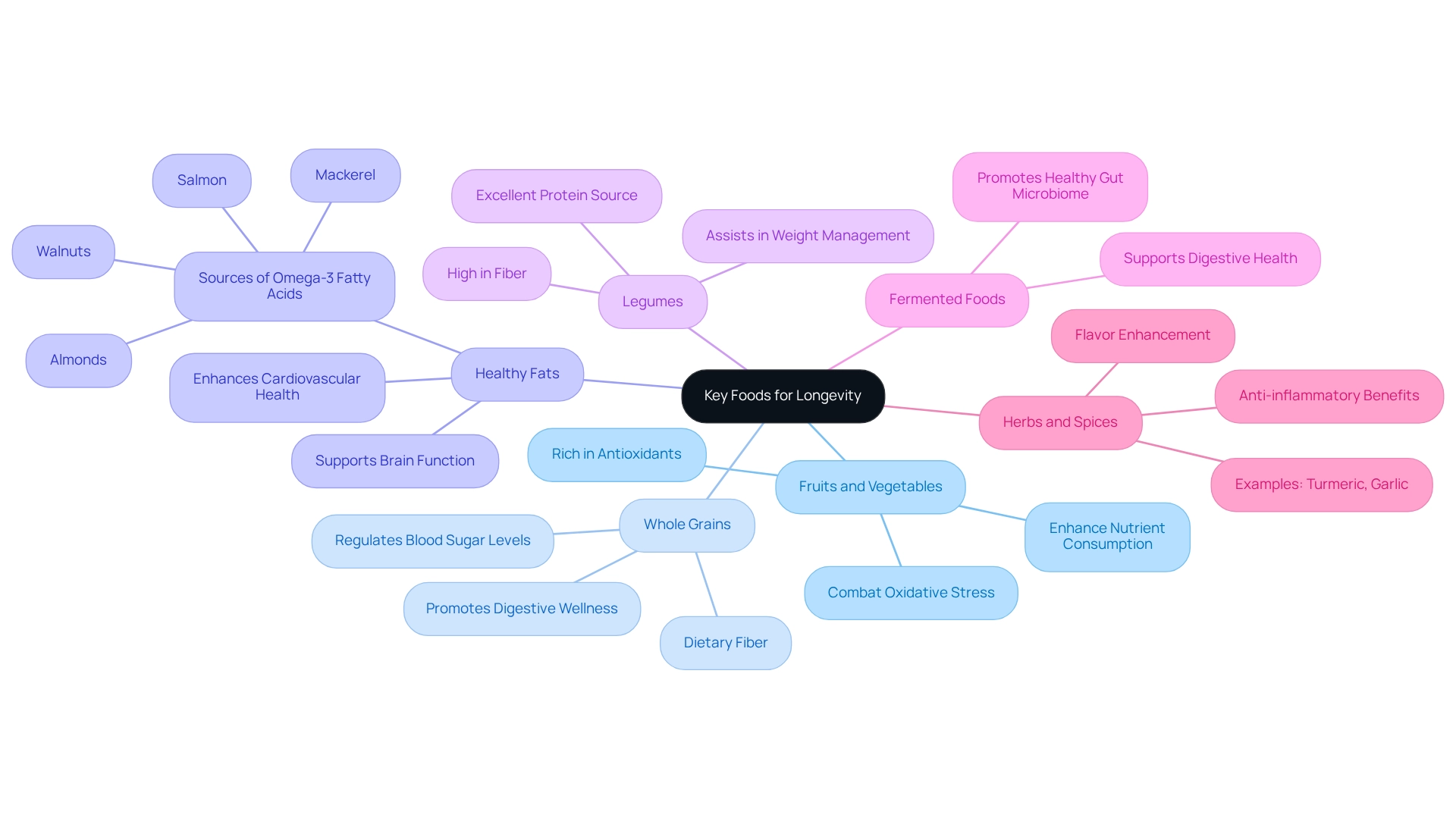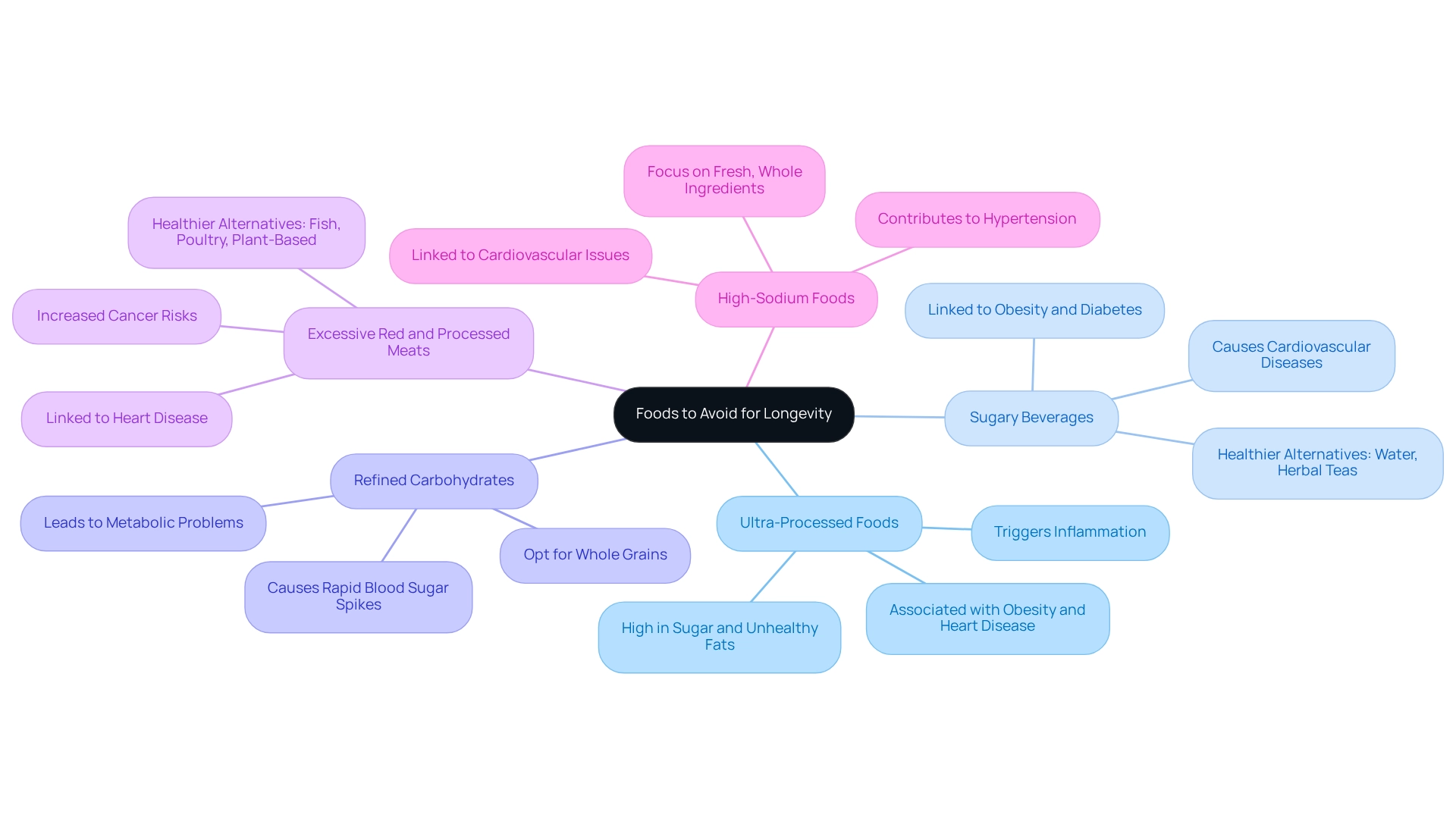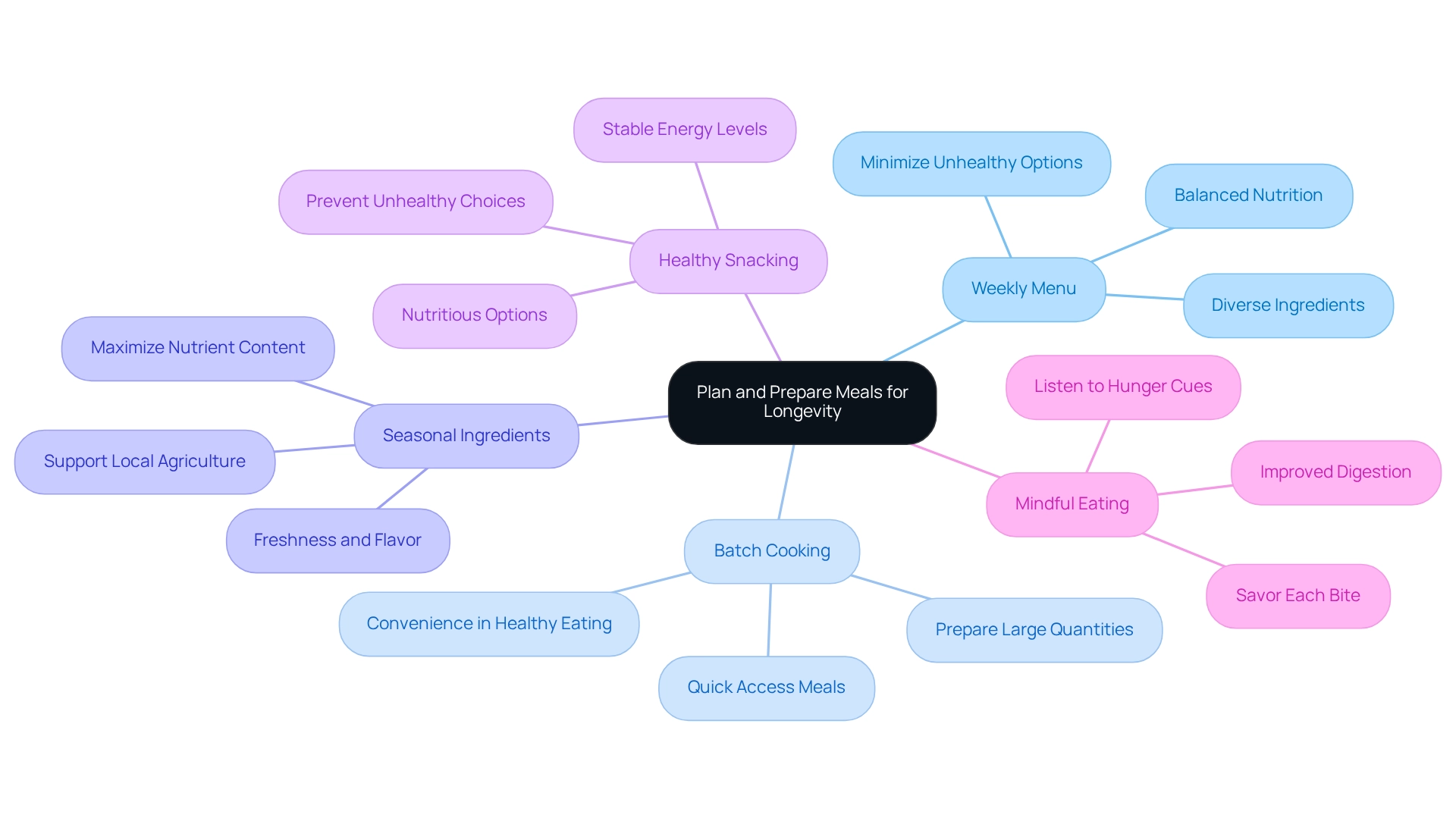Best Diet for Longevity: Key Foods and Meal Strategies
Overview
The best diet for longevity encompasses a diverse array of foods, including:
- Fruits
- Vegetables
- Whole grains
- Healthy fats
- Legumes
- Fermented foods
These elements collectively support overall health and lower the risk of chronic diseases. Notably, dietary patterns such as the Mediterranean and Okinawa diets emphasize these food groups and are associated with increased lifespan and enhanced well-being. This underscores the significance of nutrient-rich meals in promoting longevity. By integrating these food choices into your daily routine, you can take a meaningful step toward a healthier, longer life.
Introduction
In a world where the quest for longevity is becoming increasingly prominent, the choices made at the dining table can significantly influence the length and quality of life. From vibrant fruits and vegetables to nutrient-dense whole grains, the right foods can act as powerful allies in the pursuit of a longer, healthier existence.
As various dietary patterns emerge, each offering unique benefits, understanding what to embrace and what to avoid becomes essential. Furthermore, effective meal planning and preparation strategies can transform healthy eating from a challenge into a sustainable lifestyle.
This article delves into the key foods, dietary patterns, and practical tips that can help individuals not only extend their years but also enhance their overall well-being.
Identify Key Foods for Longevity
Key foods that promote longevity include:
- Fruits and Vegetables: Essential for combating oxidative stress and inflammation, these foods are rich in antioxidants, vitamins, and minerals. A varied range of colors not only enhances the visual appeal of dishes but also optimizes nutrient consumption, which is crucial for preserving well-being as one ages.
- Whole Grains: Incorporating whole grains such as quinoa, brown rice, and oats is vital for providing dietary fiber. This fiber promotes digestive wellness and helps regulate blood sugar levels, contributing to overall well-being.
- Healthy Fats: Sources of omega-3 fatty acids, including fatty fish like salmon and mackerel, as well as nuts such as walnuts and almonds, are linked to enhanced cardiovascular health and cognitive function. These fats significantly reduce inflammation and support brain function.
- Legumes: Beans, lentils, and chickpeas are excellent sources of protein and are abundant in fiber, contributing to satiety and overall well-being. Including them in the diet can assist in weight management and enhance metabolic health.
- Fermented Foods: Foods like yogurt, kefir, and sauerkraut are recognized for their role in supporting digestive health. A healthy gut microbiome is essential for overall well-being and impacts various aspects of health, including immunity and digestion.
- Herbs and Spices: Adding herbs such as turmeric and garlic not only enhances the flavor of dishes but also provides anti-inflammatory benefits. These ingredients can be powerful allies in promoting health and longevity.
Moreover, the Hunza people’s nutrition, which consists of a substantial quantity of high-quality animal-derived products such as grass-fed meats and dairy, highlights the potential advantages of a carnivore approach to nourishment. Their lifestyle, characterized by a high intake of nutrient-rich items, contributes to their remarkable longevity, with many reaching the milestone of their centennial birthdays. Research indicates that dietary changes can significantly improve the quality of life as individuals age. For instance, studies have shown that a regimen rich in fruits and vegetables is part of the best diet for longevity, leading to better health outcomes and underscoring the importance of these foods in longevity-enhancing meal plans. Nutritionists emphasize that the nutritional value of fruits and vegetables is vital for aging individuals, making them essential components of the best diet for longevity.

Understand Dietary Patterns That Promote Longevity
Several dietary patterns have been linked to increased longevity, each offering unique benefits:
-
Mediterranean Diet: This diet prioritizes whole foods, healthy fats—particularly olive oil—and a rich variety of fruits, vegetables, and legumes. Research indicates that the Mediterranean eating pattern is considered the best diet for longevity as it significantly lowers the risk of chronic diseases and enhances heart health. A 2025 study highlighted that individuals adhering to the best diet for longevity experienced a 25% reduction in mortality rates compared to those with less compliance.
-
Okinawa Diet: Famous for its contribution to the lifespan of Okinawan centenarians, this diet includes a high consumption of vegetables, tofu, and sweet potatoes. It is low in calories but rich in nutrients, aiding the impressive well-being and lifespan noted in this group. Success stories from Okinawa demonstrate how this dietary pattern is considered the best diet for longevity, promoting not only lifespan but also wellbeing, the duration of life spent in good condition.
-
Hunza Nutrition: The Hunza population, recognized for their extraordinary lifespan, includes a regimen abundant in whole items, such as fruits, vegetables, and high-quality animal-based products. Their dynamic way of living, defined by daily physical work and natural types of exercise, complements their dietary selections, enhancing their overall well-being and lifespan. This combination of nutrition and physical activity is an effective model for following the best diet for longevity and healthy aging.
-
Plant-Based Regimens: Highlighting a high intake of plant items while reducing animal products, these regimens have been linked to decreased mortality rates. They focus on whole, minimally processed foods that deliver essential nutrients, making it the best diet for longevity and promoting overall health.
-
Flexitarian Plan: This flexible approach promotes a predominantly plant-based eating style while allowing occasional meat consumption. By minimizing strict dietary limitations, the flexitarian approach promotes sustainable eating habits that can be upheld over the long term, making it an attractive choice for many.
The flexibility of these eating plans is essential for achieving the best diet for longevity. For instance, the Mediterranean eating plan allows for flexibility in meal planning, enabling individuals to swap low-protein meals between lunch and dinner, thus empowering them to take control of their eating habits. As Valter Longo observes, although altering one’s diet for healthy living to follow the best diet for longevity can be difficult, it is definitely achievable. This personalization is essential to encouraging a sustainable method of dietary selections that enhance long-term health.

Avoid Foods That Hinder Longevity
To promote longevity, it is essential to limit or avoid the following foods:
-
Ultra-Processed Foods: These products are often laden with high levels of sugar, unhealthy fats, and artificial additives, which can trigger inflammation and contribute to chronic diseases. Research shows that the intake of ultra-processed foods is associated with a variety of medical problems, including obesity and heart disease.
-
Sugary Beverages: High sugar intake from drinks such as sodas and sweetened juices is strongly associated with obesity, diabetes, and cardiovascular diseases. Instead, opt for healthier alternatives like water, herbal teas, or infused water to stay hydrated without the added sugars.
-
Refined Carbohydrates: Foods such as white bread, pastries, and sugary cereals can cause rapid spikes in blood sugar levels, leading to metabolic problems over time. Opting for whole grains can offer more stable energy and improved wellness results.
-
Excessive Red and Processed Meats: High consumption of red and processed meats has been linked to increased risks of certain cancers and heart disease. Lean protein sources, such as fish, poultry, and plant-based options, are healthier alternatives that can support longevity.
-
High-Sodium Foods: Excessive salt intake is a significant contributor to hypertension and cardiovascular issues. Concentrating on fresh, whole ingredients can aid in naturally lowering sodium levels in your meals, encouraging improved heart health.
By making informed dietary choices and steering clear of these detrimental items, individuals can significantly improve their chances of adhering to the best diet for longevity and enjoying a longer, healthier life.

Plan and Prepare Meals for Longevity
Effective meal planning and preparation can significantly enhance adherence to the best diet for longevity.
- Create a Weekly Menu: Strategically plan meals for the week, incorporating a diverse array of fruits, vegetables, whole grains, and high-quality proteins. This approach not only ensures balanced nutrition but also minimizes the temptation to resort to unhealthy options.
- Batch Cooking: Prepare large quantities of meals in advance, such as hearty soups, nourishing stews, or vibrant grain salads. These can be portioned and stored for quick access throughout the week, making healthy eating more convenient.
- Incorporate Seasonal Ingredients: Utilize seasonal produce to guarantee freshness and maximize nutrient content. This practice not only improves flavor but also supports local agriculture, contributing to a sustainable nutrition system.
- Healthy Snacking: Prepare nutritious snacks, such as sliced vegetables, mixed nuts, or yogurt, to have readily available when hunger strikes. This proactive approach helps prevent unhealthy choices and keeps energy levels stable.
- Mindful Eating: Foster a healthier relationship with food by encouraging mindful eating practices. Savor each bite and listen to hunger cues, which can lead to improved digestion and satisfaction with meals.
Incorporating these strategies can lead to the best diet for longevity, resulting in a more sustainable and enjoyable approach to healthy eating that ultimately supports long-term health and vitality.

Conclusion
Dietary choices are pivotal in promoting longevity and enhancing overall health. Key foods such as fruits and vegetables, which are packed with antioxidants, along with whole grains, healthy fats, and legumes, contribute to better digestion and reduced inflammation. Furthermore, incorporating fermented foods and herbs can amplify these benefits, emphasizing the need for a balanced diet in the pursuit of a longer life.
Examining dietary patterns like the Mediterranean, Okinawa, and Hunza diets illustrates how cultural eating habits influence lifespan. These diets focus on whole, nutrient-dense foods and balance, showing that sustainable eating practices lead to improved health outcomes. In addition, flexible approaches, such as plant-based and flexitarian diets, make healthy eating more attainable and enjoyable.
It is equally essential to avoid foods that can hinder longevity. Reducing the intake of ultra-processed items, sugary beverages, and excessive red meats can help mitigate the risk of chronic diseases. Making informed choices about what to include and exclude from the diet is crucial for achieving lasting health benefits.
Effective meal planning and preparation strategies further support the adoption of a longevity-promoting diet. By creating menus, batch cooking, and practicing mindful eating, individuals can consistently nourish their bodies with the right foods. Embracing these principles paves the way for enhanced health and a more fulfilling, longer life.
Frequently Asked Questions
What are the key foods that promote longevity?
Key foods that promote longevity include fruits and vegetables, whole grains, healthy fats, legumes, fermented foods, and herbs and spices.
Why are fruits and vegetables important for longevity?
Fruits and vegetables are essential for combating oxidative stress and inflammation. They are rich in antioxidants, vitamins, and minerals, and a varied range of colors optimizes nutrient consumption, which is crucial for well-being as one ages.
How do whole grains contribute to longevity?
Whole grains, such as quinoa, brown rice, and oats, provide dietary fiber that promotes digestive wellness and helps regulate blood sugar levels, contributing to overall well-being.
What role do healthy fats play in longevity?
Healthy fats, particularly omega-3 fatty acids found in fatty fish and nuts, are linked to enhanced cardiovascular health and cognitive function. They significantly reduce inflammation and support brain function.
What benefits do legumes offer for longevity?
Legumes, such as beans, lentils, and chickpeas, are excellent sources of protein and fiber, contributing to satiety, weight management, and metabolic health.
How do fermented foods support longevity?
Fermented foods like yogurt, kefir, and sauerkraut support digestive health and contribute to a healthy gut microbiome, which is essential for overall well-being, immunity, and digestion.
What is the significance of herbs and spices in a longevity-promoting diet?
Herbs and spices, such as turmeric and garlic, enhance the flavor of dishes and provide anti-inflammatory benefits, making them powerful allies in promoting health and longevity.
What dietary practices are associated with the Hunza people’s longevity?
The Hunza people’s diet includes a substantial quantity of high-quality animal-derived products, such as grass-fed meats and dairy, which contributes to their remarkable longevity, with many reaching centennial birthdays.
What impact do dietary changes have on aging individuals?
Research indicates that dietary changes, particularly a regimen rich in fruits and vegetables, can significantly improve the quality of life as individuals age and lead to better health outcomes.


